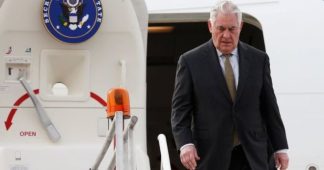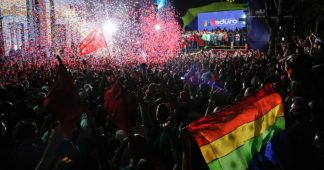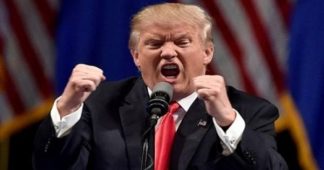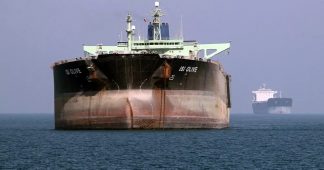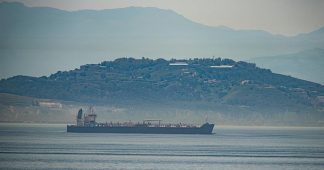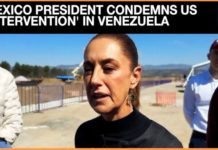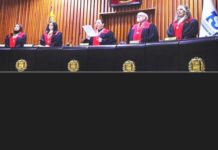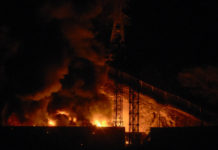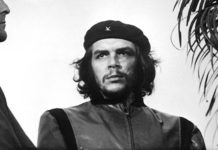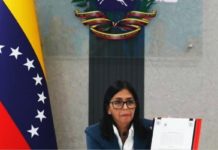December 31, 2020
The balance between the US drive to dominate Latin America and the Caribbean and its counterpart, the Bolivarian cause of regional independence and integration, tipped portside by year end 2020 with major popular victories, including reversal of the coup in Bolivia and the constitutional referendum in Chile. Central has been the persistence of Venezuela’s Bolivarian Revolution against the asphyxiating US blockade, along with the defiance by Cuba and Nicaragua of US regime-change measures.
The grand struggle played out against the backdrop of the worldwide COVID-19 pandemic, impacting countries differently depending on their political economies. As of this writing, Venezuela, Nicaragua, and Cuba had COVID death rates per million population of 35, 25, and 12, respectively. In comparison, the death rates in right-leaning neoliberal states of Peru, Brazil, Chile, Colombia, Panama, Honduras, and Guatemala were respectively 1123, 888, 849, 805, 843, 306, and 263. The manifestly lower rates on the left reflected, in large part, better developed public health systems and social welfare practices.
Andean Nations
Venezuela’s continued resistance to the US “maximum pressure” hybrid warfare campaign is a triumph in itself. Hybrid warfare – a diplomatic, propaganda, and financial offensive along with a crippling illegal blockade and attack on the Venezuelan currency – kills as effectively as open warfare. “It bleeds the country slowly and is much more devastating than direct bombardment,” observes Vijay Prashad of the Tricontinental Institute.
Venezuela featured prominently in the campaign speeches of Trump and Biden, with both promoting regime change, as they vied for the votes of the right-leaning Venezuelan émigré community in Florida, the second largest Latinx group in that critical swing state. US-anointed fake President of Venezuela, Juan Guaidó, received a standing ovation at Trump’s State of the Union address in February – about the only thing the Democrats and Republicans agreed on – but received a far less friendly reception back home.
In March, the US falsely charged Venezuela of narco-terrorism, placing multi-million-dollar bounties on the heads of Venezuela’s President Nicolás Maduro and other officials. A naval armada was sent off the coast of Venezuela under the pretext of interdicting drugs. US government data, however, show the source of the drugs and the countries through which the illicit substances transit to the US are precisely the US client regimes in the region such as Colombia and Honduras.
In May, mercenaries launched an attack from Colombia but were captured, including two US ex-Green Berets. Initially, some Iranian oil tankers evaded the US blockade to bring critically needed fuel to Venezuela, where refining capacity has been impacted by the US sanctions. But later the US seized tankers in international waters, like pirates of yore, having a devastating impact on transport, agriculture, water treatment, and electricity generation in Venezuela.
In another victory in June, federal charges were dropped against the final four embassy protectors, who had defended the Venezuelan Embassy in Washington last year from being usurped by the illegal Guaidó forces. Kevin Zeese, one of the four and a revered progressive movement leader in the US, tragically and unexpectedly died in his sleep in September.
In October, Venezuela adopted controversial anti-blockade measures aimed at facilitating private investment and circumventing the US blockade. The unrelenting US regime-change campaign has had a corrosive effect on Venezuela’s attempt to build socialism. With the economy de facto dollarized, among those hardest hit are government workers, the informal sector, and those without access to dollar remittances from abroad who continue to be paid in the bolivar, now ever more grossly inflated.
Prior to calling the US presidential elections a fraud, Trump made the same accusation regarding the elections for the Venezuelan National Assembly and for the same reason; his preferred candidates would not win. The opposition to the leftist government in Venezuela was divided between an extremist Guaidó faction, which heeded the US directive to boycott the election, and a more moderate grouping opposed to the US blockade, open to dialogue with the Maduro administration, and in favor of US recognition of the Maduro government. Although turnout was low for the December 6 election, the ruling Socialist Party enjoyed a landslide victory giving them a mandate.
Guaidó, who has become an embarrassment, may be dropped by the new US administration. Biden, however, is expected to “keep using [the] US sanctions weapon but with sharper aim,” as reported by Reuters.
Colombia is the chief regional US client state, distinguished by being the largest recipient of US military aid in the hemisphere and the largest world source of illicit cocaine. With at last seven US military bases, Colombia is a principal staging point for paramilitary attacks on Venezuela. President Iván Duque continues to disregard the 2016 peace agreement with the guerrilla FARC as Colombia endures a pandemic of rightwing violence. In October, the largely indigenous Minga mobilization converged on the capital of Bogotá to protest rampant killings. A national strike followed, called by a broad coalition led by the teachers’ union FECODE. Colombia is the most dangerous country to be a social activist with a leader murdered every other day. The approaching 2022 presidential election could portend a sea change for the popular movement.
Ecuador achieved international notoriety with the streets of Guayaquil littered with dead bodies attributed to mismanagement of the pandemic by President Lenín Moreno. A vice president under leftist Rafael Correa, Moreno turned sharp right after his presidential election in 2017, reversing the anti-imperialist stance of his predecessor. Moreno is prosecuting his former allies and privatizing the state-owned electric and oil companies, while poverty has worsened. Moreno’s popularity rating plummeted to an abysmal 8%, and his administration has been wracked with corruption scandals and popular, anti-neoliberal revolt. Polls for the presidential election, scheduled for this coming February 7, give progressive Andrés Arauz a lead as the Pink Tide may again rise in Ecuador.
Peru. The crises in Peru last year, which saw a succession of corrupt presidents replacing former ones with some sent to prison, were repeated this year. President Martín Vízcarra was dismissed in December, followed by the Manuel Merino presidency of less than a week, followed by the appointment of President Francisco Sagasti. COVID raged in a country, where investment in public health is half that recommended by the World Health Organization, while the youth took to the streets in protest, some demanding a new constitution. A left current is building in Peru as seen with the promising candidacy of Verónika Mendoza in the upcoming April 2021 presidential contest.
Bolivia. Evo Morales returned to Bolivia less than a year after a US-backed coup forced him to escape. Morales had won his reelection bid in October 2019, but the Organization of American States (OAS) conspired with the US and the domestic ultra-right to allege that his victory was fraudulent. Although his reelection was proven fair, the intervention of the OAS gave a patina of legitimacy to the ensuing putsch. Rightwing Senator Jeanine Añez was installed as “interim-president” after Morales was forced to resign by the military and police hierarchy. She presided over two massacres and a campaign of repression against the majority indigenous population and activists of Morales’s party, the Movement Towards Socialism (MAS). A heroic resistance based on strong grassroots organizing by social movements, unions, and the MAS, forced Añez to call a new presidential election, after she had postponed it three times.
On October 18, MAS presidential candidate Luis Arce won with a landslide 55%. The new government has returned to ALBA, CELAC, and UNASUR – regional bodies founded by Hugo Chávez – but is saddled with a $300M loan from the IMF, made by Añez though not authorized by the Senate. The year closed with the Constitution Court propitiously overruling a domestic law that banned same-sex union as inconsistent with international law, permitting the first legal same-sex marriage in Bolivia.
The Southern Cone
Brazil. Jair Bolsonaro’s second year in office was like the first: dismantling social welfare measures and rewarding multinational corporations, while the Amazon burned and the popular sectors protested. His unscientific belief in coronavirus herd immunity contributed to excessive deaths in Brazil, especially impacting indigenous peoples.
Chile has been in turmoil for most of the year with protests against their corrupt President Sebastian Piñera, incidentally the richest person in the country. Finally, on October 23, the rightwing politicians were forced to allow a plebiscite, which passed with a resounding 78% to replace the constitution imposed on the country by the dictator Pinochet. The vote was preceded by a week of massive demonstrations commemorating the first anniversary of the popular struggle against the neoliberal order. Elections for Constituent Assembly members are scheduled for April and presidential elections are scheduled for November, with Communist Eduardo Artés now leading in the polls.
Argentina. The new President Alberto Fernández and VP Cristina Fernández are slowly recovering Argentina after four years of rightwing governance. On October 17, crowds celebrated Peronist loyalty day in support of the center-left government. Emilio Pérsico said their movement is revolutionary because “it gave power to those who had no power and incorporated the workers into politics.”
Caribbean
Cuba’s Henry Reeve International Medical Brigade has been nominated for the Nobel Peace Prize for its medical missions combatting the pandemic across the world. Cuba is also producing COVID-19 vaccines and is in the process of distributing them to needy countries, all the while suffering under an intensified US blockade. While decrying foreign interference in US internal affairs, the Trump administration has funded some 54 regime-change groups in Cuba through the USAID and the National Endowment for Democracy. The economy has been severely impacted by the pandemic and tightening of US sanctions, forcing Cuba to take pragmatic economic adjustments.
Puerto Rico, a spoil that the US empire gained in the first war of imperialism, the Spanish-American War of 1898, is today one of the few outright remaining colonies in the world. Emblematic of the neglect of Puerto Rico was the physical collapse on December 1 of the Arecibo Observatory’s giant radio telescope, once the largest in the world and source of pride. Nearly 60% of the island’s children live in poverty.
Haiti has been in nearly continuous popular revolt against US-backed President Jovenal Moïse, who has ruled by decree after cancelling elections. Government repression has been violent and intense, which is ignored in the western press.
Central America and Mexico
Central America was battered by not only the pandemic but two devastating hurricanes that hit just ten days apart in October. As conditions further deteriorate, migrants, especially from the US client states of El Salvador, Honduras, and Guatemala, continue to flee to the US. Migrants and asylum seekers, who were then deported back from the US, have been killed, raped, or tortured when they were forced to return, according to human rights groups.
El Salvador. In a flagrant overreach of executive prerogative, President Nayib Bukele sent the military on February 9 into the Legislative Assembly to influence a vote on his proposed security program. Bukele, formerly associated with the left FMLN party, has now turned right, militarizing the border between El Salvador and Honduras to enforce the “safe third country agreements” and joining the pro-US interventionist Lima Group.
Guatemala. Angry citizens burned down Guatemala’s congress building on November 21, after a record high budget passed giving the legislators substantial raises and rewarding multinational corporations but cutting social welfare. A national strike followed demanding the resignation of rightist President Alejandro Giammattei, a former director of the Guatemalan penitentiary system.
Honduras. Eleven years since the US-backed coup overthrew the democratically elected President Manuel Zelaya, the country has devolved into a state where current President Juan Orlando Hernández is an unindicted drug smuggler, the intellectual authors who ordered the assassination of indigenous environmental leader Berta Cáceres run free, Afro-descendent people and women are murdered with impunity, gang violence is widespread, and state protection from pandemic and hurricanes is grossly deficient.
Costa Rica. Workers staged a week-long national strike in October against the neoliberal policies of President Carlos Alvarado, who then ignored the people and resumed negotiations with the International Monetary Fund (IMF), sparking more popular demonstrations. Despite intervention by the Catholic Church to diffuse the protests, the rebellion against destructive tax increases, cuts to public services, and privatizations “has changed the political dynamics in a country which was formerly seen as ‘the Switzerland of Central America,’” according to journalist Rob Lyons.
Nicaragua. Under the Sandinista government of President Daniel Ortega, Nicaragua enjoys: “reduction of poverty and extreme poverty, eradication of illiteracy, the highest economic growth in the region for a decade, free quality education, change of the energy matrix to 77% renewable energy, [and] from 90th place to number 5 worldwide…in reducing the gender inequality gap.”
Given this “threat of a good example,” US efforts to isolate Nicaragua economically to achieve regime change continued. Reports by the PBS NewsHour, the Center for Investigative Reporting’s Reveal, and the Oakland Institute of alleged abuses to the indigenous and Afro-descendent communities provided evidence in support of boycotting the import of “conflict beef,” which would have had a major impact on the Nicaraguan economy. After the allegations were exposed as unsubstantiated, the accusers hypocritically claimed their actions resulted in the Nicaraguan government correcting itself.
The US State Department has already called the Nicaraguan presidential election a fraud even though it is not scheduled until November 2021. After Venezuela and Cuba, Nicaragua is the hardest hit country in Latin America by US sanctions.
Mexico is the second largest economy in Latin America, the eleventh in the world, and the US’s top trade partner. After decades of right-wing rule, left-of-center Andrés Manuel López Obrador (AMLO) and his new MORENA party have been in office for two years.
A little over a year ago, Mexico flew then President Evo Morales out of Bolivia, when his life was threatened by a rightwing coup, and gave asylum in the Mexican Embassy in La Paz to other deposed Bolivian officials. Mexico has also defied the US blockade of Venezuela, and AMLO has called for the release of whistleblower Julian Assange.
Last spring, AMLO closed factories in response to the pandemic except for those supplying essential services. Workers went on strike when some factory owners defied the government closures. The US intervened forcing border maquiladoras that produce goods for the US military to open.
With high COVID infection rates, AMLO has been criticized for what some characterize as a lax and delayed handling of the health crisis. He was also confronted by protests from the extreme right nationalist coalition FRENA, demanding that the “Bolivarian Dictator” must resign, while a rightist plan called Project BOA outlined a strategy for ousting him from office.
In July, AMLO made an official state visit to Washington. “Under Trump, Mexico has had to navigate abrupt demands to stem illegal migration or face trade tariffs.” As the nineteenth century Mexican President Porfirio Díaz famously lamented: “Poor Mexico, so far from God and so close to the United States.”
Campaign for 2021
UN Secretary General Guterres’s plea for a “global ceasefire,” ever more necessitated by “the fury of the virus,” has been ignored by the US. Meanwhile, some 30 nations worldwide, including Venezuela, Nicaragua and Cuba, are suffering under suffocating US sanctions, which are a form of hybrid warfare. These unilateral, coercive measures, impacting a third of humanity, are illegal under the UN Charter. As the “liberator” Simón Bolívar presciently observed in 1829: “The US appears to be destined by providence to plague the Americas with misery in the name of freedom.”
Published at www.counterpunch.org
